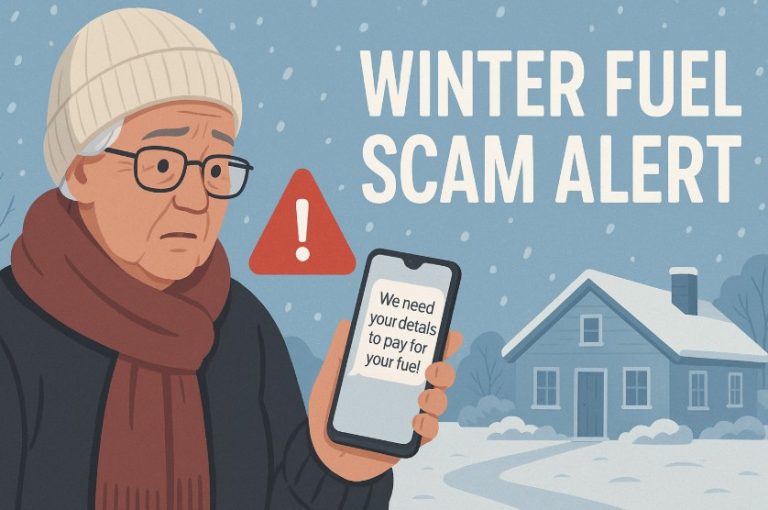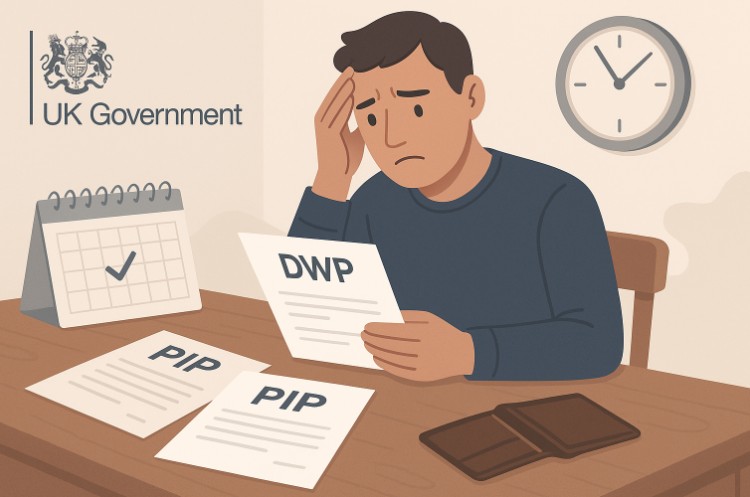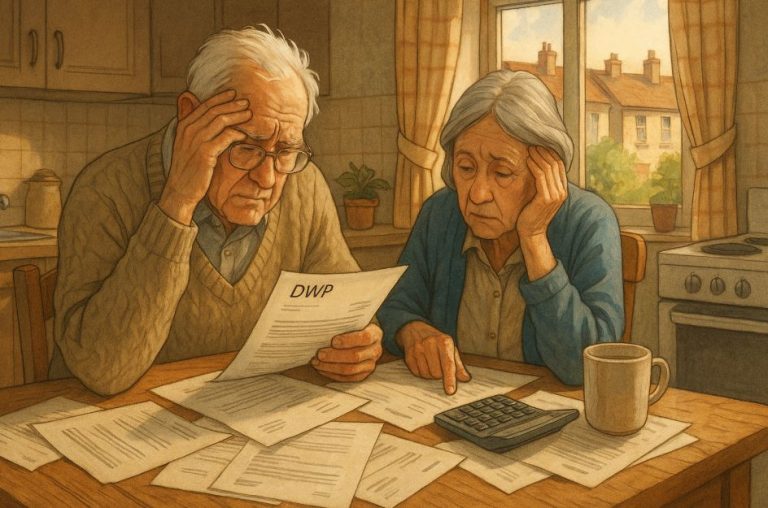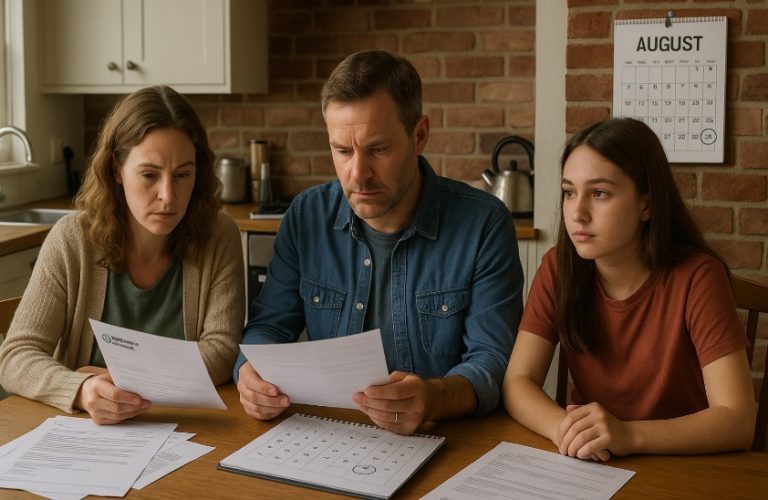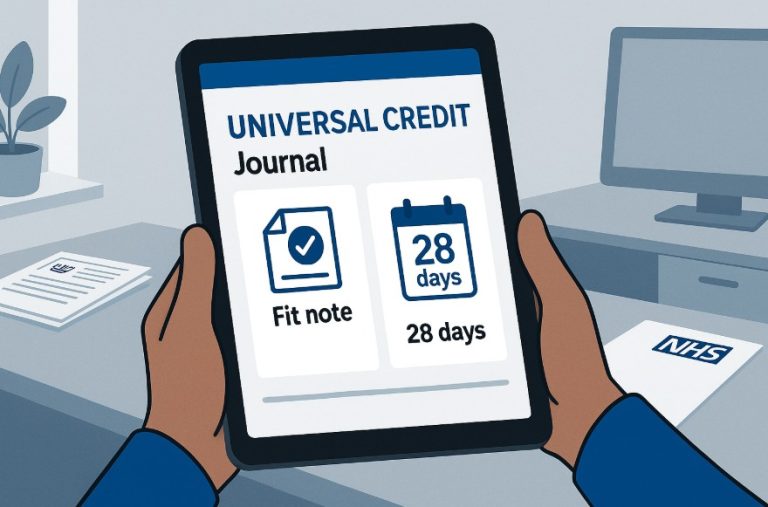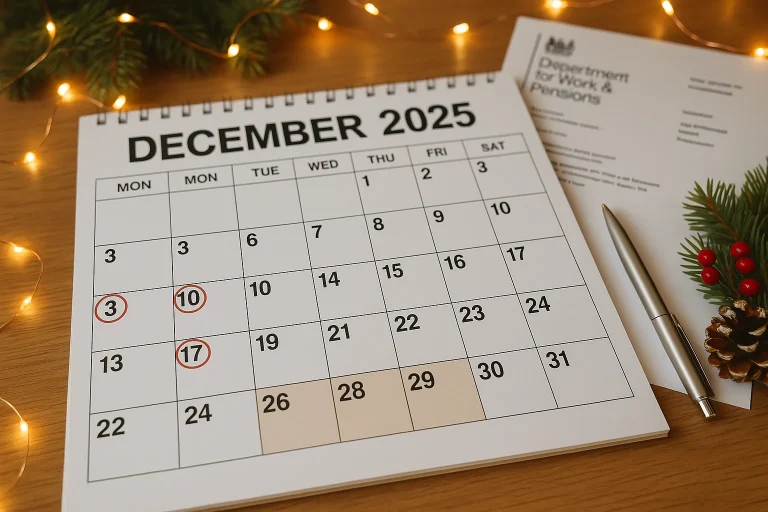As the colder months approach and the cost-of-living crisis continues to impact millions across the country, the UK government is once again stepping in to provide financial relief to struggling households.
The Department for Work and Pensions (DWP) is set to distribute a series of targeted payments to eligible individuals and families before Christmas.
For those meeting the qualifying criteria, the total amount could reach up to £1,085 providing a much-needed financial buffer just in time for the festive season.
This article outlines each of these payments, who qualifies, and how to ensure you’re not missing out on essential government support before the end of 2025.
What Is the Total £1,085 Payment and Who Qualifies for It?

The total amount of £1,085 is made up of a combination of government payments targeting various groups across the UK.
Each payment is tied to specific criteria, which means only a subset of people will qualify for the full amount.
The payments include:
| Payment Type | Estimated Amount | Notes on Eligibility |
| Household Support Fund | £130 – £600 | Varies by local council and applicant’s need |
| Warm Home Discount | £150 | Applied to electricity bill, not cash |
| Winter Fuel Payment | £200 – £300 | Based on age and benefits received |
| Christmas Bonus | £10 | One-off DWP bonus for eligible claimants |
| Cold Weather Payments | £25 per week | Temperature-based, issued when local temps drop to 0°C |
A person receiving a mix of benefits such as Pension Credit and Universal Credit could qualify for multiple schemes.
Those who live in colder parts of the UK and are affected by lower temperatures could receive additional Cold Weather Payments, increasing the total received.
How Does the Household Support Fund Help Vulnerable Families?
The Household Support Fund (HSF) is one of the most significant financial support schemes provided by the UK government through the Department for Work and Pensions (DWP).
Its primary objective is to help vulnerable and low-income families cope with essential living expenses, especially during periods of financial hardship, such as the winter months when energy and food costs often spike.
What Is the Household Support Fund?
Initially launched in 2021 as a short-term cost-of-living response, the scheme has since been extended multiple times due to continued economic pressures, including inflation and rising energy bills.
For the period April 2025 to March 2026, the fund has been renewed and allocated to County Councils and Unitary Authorities across England, who are responsible for distributing it based on local needs.
The DWP allocated over £740 million in funding nationally for this round, emphasising flexible, localised support rather than a one-size-fits-all approach.
What Can the Fund Be Used For?
Unlike some other forms of government support, the Household Support Fund is not tied to a single type of expense. It’s designed to cover a broad range of essential needs, which may include:
- Energy bills (electricity, gas, water)
- Food and groceries
- Essential household items (e.g. white goods, beds, clothing)
- Housing costs (in exceptional cases)
- School uniform assistance or support for families during school holidays
Councils are encouraged to use the fund creatively and responsively to meet the urgent needs of residents who may fall through the gaps of other benefit schemes.
Who Is Eligible?
Eligibility is set by each individual local authority, meaning there are variations in criteria across the UK. However, most councils prioritise applicants who are:
- Already receiving means-tested benefits (e.g. Universal Credit, Pension Credit, Housing Benefit)
- Identified as financially vulnerable by housing associations, food banks, or community groups
- Households with children eligible for free school meals
- Elderly or disabled individuals on low incomes
- Unpaid carers or households experiencing a sudden change in circumstances (such as job loss or illness)
It’s important to note that you do not need to be on benefits to apply. Many councils also allow applications from residents who are in work but facing temporary or long-term financial strain.
How to Apply for the Household Support Fund?
The application process is managed locally, and most councils have set up dedicated online portals where residents can submit their applications. Some may also offer paper forms or phone applications for those without internet access.
To apply, you will generally need to provide:
- Proof of identity
- Evidence of income or benefits received
- Recent utility bills or tenancy agreements
- Bank statements or other financial documents
Some councils operate automated targeting, meaning you may receive a payment without needing to apply if you already claim certain benefits. For example, a household receiving Council Tax Reduction or Universal Credit might be flagged automatically.
You should check your local council’s website for details on how the scheme operates in your area, including application windows, required documentation, and payment amounts.
How Much Support Can You Receive?
The amount provided varies depending on your location and circumstances. While some councils offer flat-rate payments (e.g. £130), others assess individual applications and tailor the award accordingly sometimes up to £600 per household.
| Local Authority Example | Typical Support Range | Payment Method |
| Manchester City Council | £130 (targeted grant) | Bank transfer |
| Birmingham City Council | Up to £400 | Supermarket vouchers |
| Cornwall Council | £300–£600 | Utility bill crediting |
Payments may be made in the form of:
- Direct bank transfers
- Supermarket or fuel vouchers
- Energy top-ups (for pre-payment meters)
- Support-in-kind, such as food parcels or school meal vouchers
Why Is This Fund Important?
The Household Support Fund acts as a critical safety net for people who are often overlooked by mainstream benefits systems. Its flexibility and responsiveness allow local authorities to quickly assist households in crisis, particularly during periods of economic stress or seasonal hardship.
It also plays a vital role in preventing further financial deterioration, helping families avoid debt, rent arrears, eviction, or food insecurity.
By decentralising the management of the fund, councils can respond to the unique challenges within their communities, from rural poverty to high urban housing costs.
What If the Fund Runs Out?
Because the Household Support Fund is cash-limited, some councils operate it on a first-come, first-served basis. Once their allocation runs out, no further payments can be made unless additional funding is provided by the government.
This makes it essential for eligible households to apply early and monitor council announcements closely.
Who Is Eligible for the £150 Warm Home Discount?
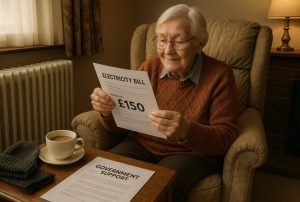
The Warm Home Discount is a government-mandated scheme provided by energy suppliers. It gives qualifying households a £150 discount on their winter electricity bill, typically applied between November and March. This is not a direct payment to the claimant but a discount credited directly to their energy account.
Eligibility is divided into two main groups:
- Core group 1: People who receive the Guarantee Credit element of Pension Credit
- Core group 2 (broader group): Low-income households who meet their energy supplier’s criteria
You must also:
- Be with a participating energy supplier
- Be named on the energy bill
- Live at the qualifying property
The government uses DWP and HMRC records to identify eligible households, meaning most recipients do not need to apply. The discount appears as a credit on electricity bills during the winter period.
If eligibility cannot be determined automatically, some households may receive a letter requesting further information to confirm their status.
What Are the Criteria for Receiving the Winter Fuel Payment of £200–£300?
The Winter Fuel Payment is intended to help pensioners with heating costs during the coldest months of the year. It is an annual, tax-free payment available to those born on or before 21 September 1959 and residing in the UK during the qualifying week.
The amount depends on both age and household circumstances:
| Age Bracket | Living Alone | Living with Another Eligible Person | Receiving Benefits |
| 66–79 years old | £500 | £250 | £500 |
| 80 years and older | £600 | £300 | £600 |
The higher figures shown here include the temporary Cost of Living top-up that may continue into the 2025–2026 period, depending on government policy at the time.
Those who qualify generally receive the payment automatically in November or December, with notifications sent via post confirming the amount and expected payment date. You may need to claim manually if:
- You have not received the payment before
- You have moved abroad
- You do not receive a State Pension or qualifying benefit
It’s important to note that these payments are not affected by savings or income, but may be taxed if total income exceeds a certain threshold.
When Will the £10 DWP Christmas Bonus Be Paid?
The DWP Christmas Bonus is a long-standing initiative introduced in 1972. It is a one-off, tax-free payment of £10 provided to people claiming certain benefits in early December.
The payment is:
- Issued automatically
- Credited to the same account as the recipient’s main benefit
- Labeled on statements as ‘DWP XB’
To qualify, claimants must be in receipt of one or more of the following benefits during the qualifying week:
- Pension Credit
- Disability Living Allowance
- Personal Independence Payment
- Carer’s Allowance
- Contribution-based Jobseeker’s Allowance
- Employment and Support Allowance (income-related)
Although the value of the bonus has not changed since its inception, it still plays a symbolic and practical role in supporting people through the festive season.
How Do Cold Weather Payments Work and When Are They Issued?

The Cold Weather Payment is triggered when the average temperature in a specific area is recorded at or forecasted to be 0°C or below for seven consecutive days. For each qualifying period, eligible households receive £25.
This scheme runs annually from 1 November to 31 March.
Eligibility is typically automatic if you receive:
- Pension Credit
- Income Support
- Income-based Jobseeker’s Allowance
- Universal Credit (with certain conditions)
These payments are not based on national forecasts but are tied to specific local weather stations. This ensures that payments reflect actual regional weather conditions.
You can use the Cold Weather Payment postcode checker on the GOV.UK website to:
- Check if your area qualifies
- See when the qualifying temperature period occurred
- Estimate when payment will be issued
No application is required. Payments are usually made within 14 working days of a qualifying cold spell.
Can You Receive All These Payments Together Before Christmas?
In theory, yes. If someone meets the eligibility criteria for all schemes and weather conditions align in their area, they could receive the maximum support of £1,085 before Christmas. However, this scenario is relatively uncommon and would typically apply to:
- Pensioners receiving Pension Credit
- Households living in colder regions
- Low-income individuals with health conditions or disabilities
- Claimants of Universal Credit or other means-tested benefits
Here’s a simplified example:
| Benefit/Support Type | Example Eligibility Met | Estimated Amount |
| Household Support Fund | Yes | £130 |
| Warm Home Discount | Yes | £150 |
| Winter Fuel Payment | Yes (over 80) | £300 |
| Christmas Bonus | Yes | £10 |
| Cold Weather Payment | Yes (2 qualifying weeks) | £50 |
| Total | £640 |
If more Cold Weather Payment periods are triggered or a council offers the higher end of the HSF, the total could increase closer to the £1,085 mark.
What Should You Do If You Haven’t Received a Payment from the DWP?

In the event of a missing payment, it’s essential to:
- Check benefit journals or payment histories (e.g. via Universal Credit online account)
- Confirm that your bank details are up to date with DWP or your council
- Review any letters or emails from energy suppliers or the DWP regarding eligibility
If something seems amiss, you can contact the following based on your situation:
- DWP General Enquiries: For queries related to State Pension, Universal Credit or ESA
- Jobcentre Plus: For those receiving JSA or Income Support
- Pension Service: For enquiries about Winter Fuel Payments or the Christmas Bonus
- Local council: For Household Support Fund claims
You should act quickly, especially if you suspect an administrative error, as some schemes may have cut-off dates or limited funding windows.
Frequently Asked Questions
What benefits qualify for the DWP’s Christmas Bonus?
The Christmas Bonus is available to recipients of specific benefits, including Pension Credit, Carer’s Allowance, PIP, and Disability Living Allowance, among others.
Can I still apply for the Household Support Fund?
Yes, but applications are handled by your local council. Visit your council’s website to check if the fund is still open and how to apply.
Will my payments arrive before Christmas automatically?
Most of these payments are automatic if you’re eligible. However, it’s advisable to confirm your details with DWP or your local authority.
How do I know if my area qualifies for Cold Weather Payments?
Use the Cold Weather Payment postcode checker on GOV.UK to see if your area meets the temperature threshold.
What if I’m not on Universal Credit — can I still get help?
Yes, many schemes are available to those on Pension Credit, Income Support, or other means-tested benefits.
Are these payments taxable?
No, most of these payments, including the Christmas Bonus, Winter Fuel Payment, and Cold Weather Payments, are tax-free.
How often do these types of support payments change?
The government reviews and adjusts eligibility and amounts annually based on economic conditions and public needs.

